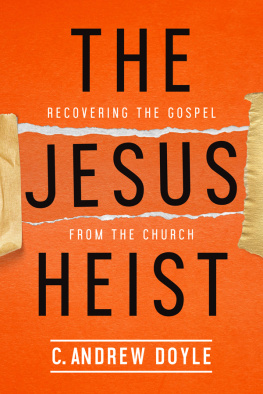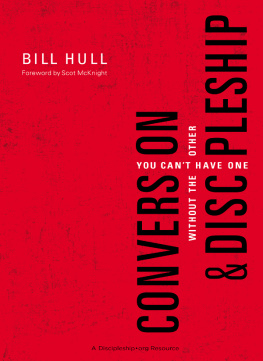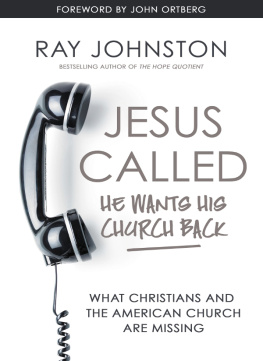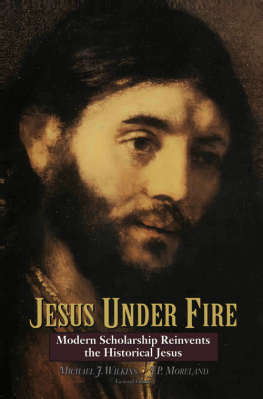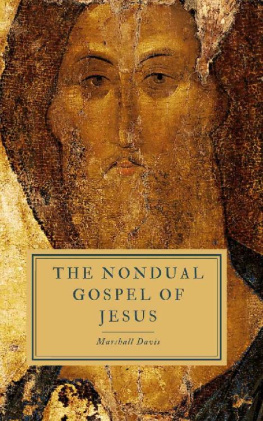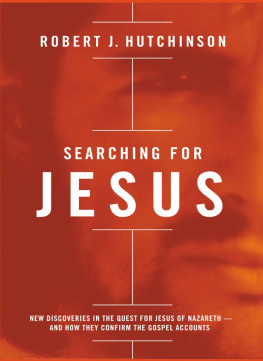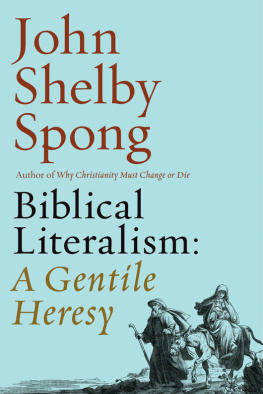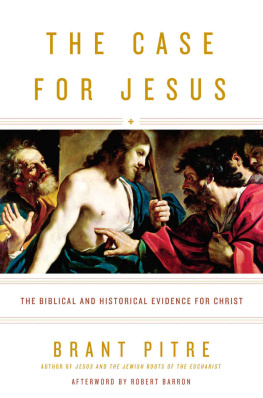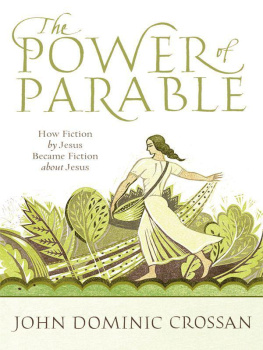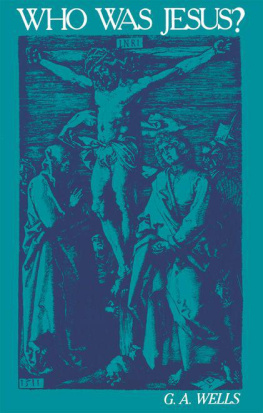THE JESUS HEIST
THE
JESUS
HEIST
RECOVERING THE GOSPEL
FROM THE CHURCH
C. ANDREW DOYLE

Copyright 2017 by C. Andrew Doyle
All rights reserved. No part of this book may be reproduced, stored in a retrieval system, or transmitted in any form or by any means, electronic or mechanical, including photocopying, recording, or otherwise, without the written permission of the publisher.
Unless otherwise noted, all quotations from the Bible are taken from Bruce M. Metzger and Roland E. Murphy, eds. The New Oxford Annotated Bible with Apocrypha: New Revised Standard Version (New York: Oxford University Press, 1994).
Church Publishing
19 East 34th Street
New York, NY 10016
www.churchpublishing.org
Cover design by Marc Whitaker, MTWdesign
Typeset by PerfecType, Nashville, Tennessee
Library of Congress Cataloging-in-Publication Data
A record of this book is available from the Library of Congress.
Library of Congress Cataloging-in-Publication Data
Names: Doyle, C. Andrew, author.
Title: The Jesus heist : recovering the Gospel from the church / C. Andrew
Doyle.
Description: New York : Church Publishing, 2017. | Includes bibliographical references.
Identifiers: LCCN 2017012631 (print) | LCCN 2017027195 (ebook) | ISBN 9780819233523 (ebook) | ISBN 9780819233516 (pbk.)
Subjects: LCSH: Bible. Gospels--Criticism, interpretation, etc. | Church renewal. | Church growth.
Classification: LCC BS2555.52 (ebook) | LCC BS2555.52 .D69 2017 (print) | DDC 226/.06--dc23
LC record available at https://lccn.loc.gov/2017012631
Dedicated to the people of the Diocese of Texas, who long to be faithful missionaries of the gospel of God in Christ Jesus. They make me want to be a better bishop of the Church of God, and for that challenge I am most grateful.
I do not mind at all if the loud-mouthed, or flatterers, or the mock-modest, or fault-finders, gossips, title-tattlers, talebearers, or any sort of grumbler, never see this book. I have never meant to write for them. So they can keep out of it.
Author of the Cloud of Unknowing
T his book is a wake-up call! Its not another call to work harder, in our own little corner of the church, to work harder at holding the building up, harder at increasing attendance, harder at defining and advertising our little niche in the religious market. Its a call to wake up and remember Jesus, wake up and hear him, wake up and follow him, wherever he goes even when he goes out of our church doors and well out of our comfort zone. Its a call to be with Jesus when he is in the strange places and with the odd people with whom we see him in the gospel. And what are those places? Who are those people? When we blow the dust off our Gospels and read them afresh, as Andy Doyle does in this book, we find that the places Jesus goes are not the churches but the streets, not the comfortable lounges but the wide open spaces and the wilderness, and when he is in the religious buildingsas for example when he goes to the templehes usually making trouble. And the most significant place of all, if we are to follow Jesus? The place no one wants to go: the dumping ground, the rubbish tip, Golgotha. The place where he was crucified and the place from which, and for which he unleashed the radical all-transforming love and forgiveness that is still alive and loose in the world, even if some of the followers of Jesus have tried to keep it confined in a church-shaped box. And the people, who are those people Jesus meets? Not, on the whole the religious, the pious, or the righteous, but the lost, the bewildered, the damaged and the damaging, the wounded and the wounding. Meeting Jesus sometimes changes their lives, but he seems happy to meet them where they are and before their lives are changed, even though such meetings scandalize the powers that be.
How is it that the church, which is after all the society of friends and followers of Jesus, has been content for so long to sit in a holy huddle bickering with each other about who remembers Jesus best, whilst Jesus himself is long gone, out there, living and loving in the world he died to save? Andy Doyle suggests that it is because we have gradually turned our attention from Jesus himself to the institutions and traditions to which we belong and we only read his gospel through the lens of our churchy preoccupations.
So this book is a call to wake up and listen again to our lord and master, to Jesus himself, not just to our highly selective and sanitized version of what we think he said. As Andy Doyle says in this book, we must set aside our ideas of church and its institution, opening our minds to the imagination of the gathered community that followed Jesus.
But this is easier said than done. As it happens, before I met Andy, I had myself been trying over the course of a year or so to free myself from other preoccupations and sit again at Jesuss feet and somehow hear afresh what he was saying, and I was doing so by composing a series of sonnets each focusing on a saying of Jesus, listening to it, wrestling with it, responding to it as honestly as I could. These sonnets were a work in progress when Andy invited me to come and read poetry with a diverse and highly interesting group of people gathered at his house. I read them a poem on the saying, he who has ears to hear let then hear, a poem which Andy quotes in this book, so it may help to tell you something about how it was written. I was wrestling with the very problem Andy tackles in this book: how to hear Jesus afresh, really hear him and follow him, not just hear the edited version I have been reading through my cultural lens. When I started the poem, I thought the problem was that the Scriptures had become too familiar, that they were covered with a film of familiarity and the dust of years and that it would just be a case of peeling back the film and blowing away the dust, so I wrote:
How hard to hear the things I think I know,
To peel aside the thin familiar film
That wraps and seals your secret just below:
An undiscovered good, a hidden realm,
But as I wrote the poem, I suddenly realized that the film and the wrappings werent really on the Scripture at allthey were on me! It wasnt a case of my unwrapping the Scripturesit was a question as to whether I would dare to let the Scriptures unwrap me! So the poem went on to see that the kingdom Jesus was describing was:
A hidden realm
A kingdom of reversal, where the poor
Are rich in blessing and the tragic rich
Still struggle, trapped in trappings at the door
They never opened, Life just out of reach...
Then came the turn in the sonnet where I had to turn to Jesus himself and say Help! Unbandage me! How foolish I was to think I had to bring your teachings back to life: it is your teachings that have to bring me back to life!
Open the door for me and take me there.
Love, take my hand and lead me like the blind,
Unbandage me, unwrap me from my fear,
Open my eyes, my heart, my soul, my mind.
I struggle with these grave clothes, this dark earth,
But you are calling Lazarus come forth!
Little did I know when I read this poem that Bishop Doyle was in the same place and making the same prayer, and indeed that there were Christians all over the world, in every denomination and church, feeling this urgent call: Wake up! Begin again!
When Jesus raised Lazarus, he gave the beautiful commandment Unbind him, and let him go (John 11:44). In many ways the institutional church has become like Lazarus, trapped in trappings, wrapped up in its own concerns, dead on its feet. But Jesus didnt leave Lazarus that way and he is not going to leave his church that way either. This book, I believe, is part of that call to the church to rise up, come forth, and be unbound and set free again to follow Jesus.

